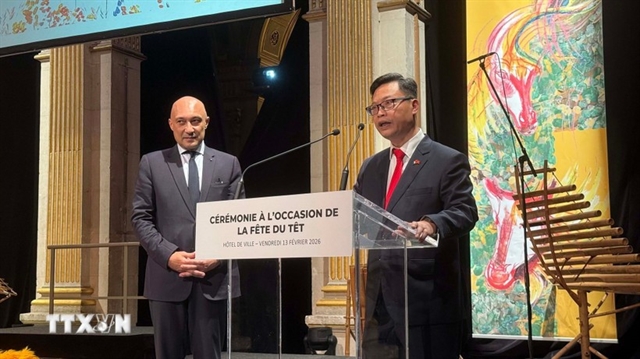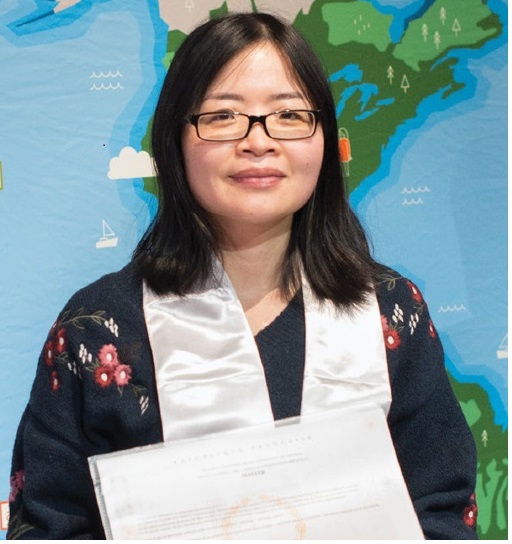 Life & Style
Life & Style

 |
| Vietnamese language teacher and translator Nguyễn Thị Thúy An. Photo phunuonline.com.vn |
Nguyễn Thị Thúy An teaches Vietnamese at the Universite Paris Cite. Alongside teaching she is also keen on translating French literature into Vietnamese, and her translation works, including Nobel prize-winning Mireille and La Place are already in print. Her translation of Hector Marlot’s Romain Kalbris will be released in February. An spoke about her interests and how popular the Vietnamese language is in France to the Hồ Chí Minh City Women newspaper.
Why did you choose Romain Kalbris to translate into Vietnamese?
This is Hector Malot's work on family education, first published in 1869.
Orphaned in childhood, Romain Kalbris is placed with a greedy uncle who treats him brutally and nearly starves him to death.
He escapes, but after a few adventures, falls back on an even harsher master. His love of independence and his desire to become a sailor lead Kalbris into many tribulations.
Through each situation, the characters' lives give lessons about how to be a human, about the role of education, about compassion and self-reliance which are skillfully conveyed by the writer.
Like Nobody's Boy and In the Family, through Romain Kalbris we feel the noble human spirit and the greatness of small people in adversity. As soon as I read the work, I was captivated by the plot and writing style. Translating the book was a great way to convey the human spirit, the goodness and the beauty of the family education story to my own readers.
You have translated several works, but last year the book Mireille was published with a limited edition and beautiful hard cover?
Translating Nobel prize winning works is perhaps my destiny. When translating works like Mireille, I have had to research the French language and local languages, regional culture and religion to be able to convey the writer's ideas.
I am very happy that the work has a worthy position, respected by the team.
When did you start translating books and what drew you to which pieces of literature?
I started translating in 2013 when I was studying for an MA in literary translation at the Institute of Oriental Languages and Civilisations INALCO in Paris.
I chose Annie Ernaux's La Place as my thesis, because of the writer's unique style and unprecedented narrative writing. After defending it, I submitted a chapter and it was first published by the Writers' Association Publishing House in 2016 and reprinted in 2022 after the writer won the Nobel Prize for Literature.
Do you choose your books to translate by yourself or do you get commissions?
I chose a few books, while the others were commissioned. However, I do not want to limit myself to translating just literature.
If I have opportunity I will translate other topics such as culture, environment and education.
Do you have any plans to translate Vietnamese books into French?
I have translated a number of short stories from French to Vietnamese for university magazines in France, not only at the schools where I work, but also in magazines related to Asian or Oriental literature.
I am also planning to do some translation from French into Vietnamese. Currently I have an order to write a Vietnamese textbook for a French publisher.
Could you tell about your Vietnamese teaching in France?
Currently, my main job is teaching Vietnamese at the Université de Paris Cité. At first, I worked as a guest lecturer for three years at Paris Diderot University.
Additionally, I taught Vietnamese for five years as a guest lecturer at Rennes 2 University in Bretagne. During this time, I also taught at INALCO.
To teach Vietnamese in France, I not only had to make an effort to learn French and understand French culture, but it was necessary to cultivate knowledge and Vietnamese culture.
In 2017, I returned to Việt Nam, attending a training course for Vietnamese language teachers abroad organised by the Ministry of Education and Training, in collaboration with the State Committee for Overseas Vietnamese.
I received a certificate at the course. After that, I continued to research Vietnamese language at INALCO after obtaining MA in literary translation. This helps me to teach Vietnamese in France.
How is it teaching in the Vietnamese community?
From the 2023-24 school year, Foyer Vietnam (Việt Nam House) in Arrondissement 5 of Paris invited me to teach evening classes for students who want to learn Vietnamese for personal or work purposes.
This year, there are three classes with different levels, each class has more than a dozen students. It can be said that from 2015 until now, I have always been attached to teaching Vietnamese. Then I find my passion partly is Vietnamese teaching, because it is the thread that connects me to Việt Nam - my roots.
In my class, there are students who have Vietnamese grandparents and parents. They are proud to be able to read, write and sing the folk songs that they heard as children and learn favourite songs of Vietnamese youth.
I know there are families with siblings who have signed up to learn Vietnamese. These classes are also aimed at students who want to learn Vietnamese as a foreign language.
There are also French who have no Vietnamese blood, but they still want to learn Vietnamese because of different reasons, such as love at first sight with Vietnamese or after a vacation trip with their family to Việt Nam.
Even though they have to go to Paris from other cities for Vietnamese learning. Some others majoring in different fields such as architecture, archaeology, religion, music and cinema also want to learn Vietnamese for their further research. VNS